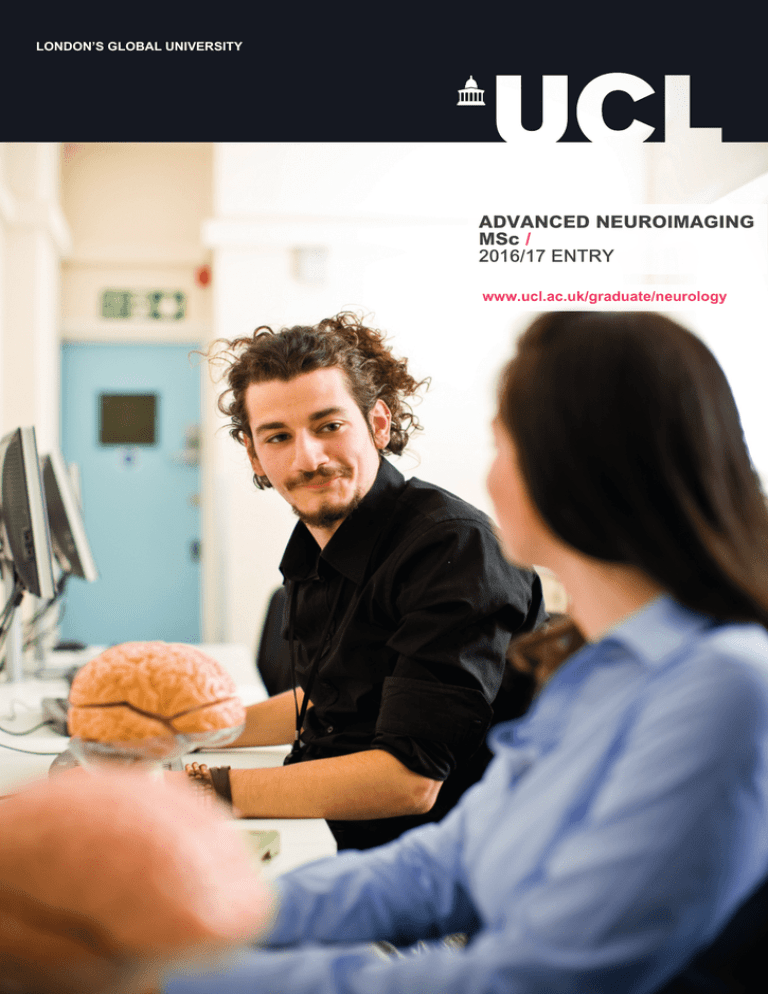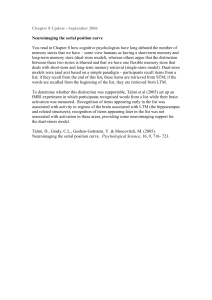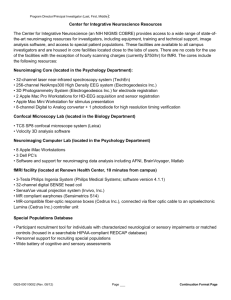ADVANCED NEUROIMAGING MSc / 2016/17 ENTRY
advertisement

LONDON’S GLOBAL UNIVERSITY ADVANCED NEUROIMAGING MSc / 2016/17 ENTRY www.ucl.ac.uk/graduate/neurology Advanced Neuroimaging MSc / This MSc is specifically aimed at those pursuing a professional career in neuroimaging, either in clinical practice or in neuroscience research. This multidisciplinary programme provides training in both the basic scientific and technological principles of modern neuroimaging methods, and in their application to understand neurological function and neurological disorders. Study by distance learning is also available. Degree summary Students will develop a foundational knowledge of neuroanatomy, understand the principles and main technical aspects of neuroimaging instrumentation and data acquisition, basic image processing and image analysis techniques, and gain a good working knowledge of modern methods for scientific and clinical investigation of the human nervous system using neuroimaging. // The focus of this degree is neuroimaging of neurological disease. Together with our associated hospital, the National Hospital for Neurology and Neurosurgery, the UCL Institute of Neurology promotes research that is of direct clinical relevance to improved patient care and treatment. // With its concentration of clinical and applied scientific activity the institute is a unique national resource for postgraduate training in neurology, its associated disciplines and the basic neurosciences. During their time at Queen Square students will have the opportunity to contribute to world-leading research and have access to cutting-edge neuroimaging facilities. The programme is taught by lectures and workshops delivered by experts in various clinical and technical fields of neuroimaging. Assessment is through written examination, coursework, presentations, research project, dissertation and viva voce. Distance learning students may spend up to three months in London carrying out the research project and receiving relevant training and mentoring. Alternatively they may carry out an extended systematic review of the literature related to a chosen field within neuroimaging. In exceptional circumstances students may carry out the research project remotely if they are based at a hospital with established research links with Principal Investigators at the UCL Institute of Neurology. Degree structure Mode: Full-time: 1 year; Part-time: 2 years Students undertake modules to the value of 180 credits. The programme consists of six core modules (90 credits), a library project (30 credits) and a research project (60 credits). CORE MODULES // Introductory Science and Methods // Imaging Modalities // Advanced Imaging // Foundational Neuroanatomy, Systems and Disease // Pathology and Diagnostic Imaging I // Pathology and Diagnostic Imaging II // Please note: every face-to-face module has a distance learning equivalent with alternative learning activities. OPTIONS // There are no optional modules for this programme. DISSERTATION/REPORT // All students undertake a library project which is assessed by a 5,000-word project, and a laboratory research project which culminates in a 10,000-word dissertation. Your career Graduates of the programme will have developed the necessary knowledge and skills essential for a future research career in the areas of neuroradiology, imaging neuroscience or neuroimaging technology. Recent career destinations* include: // // // // UCL Institute of Neurology, PhD student, 2012 // University College Hospital, London, Radiologist Research Fellow, 2012 UCL Institute of Child Health, PhD student, 2011 McGill University, Montreal, PhD student, 2012 University College London Hospitals NHS Foundation Trust, Radiographer, 2011 Employability Students on this programme are immersed in a world-class clinical and scientific environment, taught by leading experts in the field. For clinicians, and professions allied to healthcare, the programme will equip them with a sound understanding of neuroimaging techniques. For medical physicists it will enable them to develop their theoretical understanding in an internationally renowned centre. A number of high-achieving students on the programme will be offered the opportunity to undertake a paid internship at a London-based company which runs neuroimaging clinical trials. * data taken from the ‘Destinations of Leavers from Higher Education’ survey undertaken by HESA looking at the destinations of UK and EU students in the 2010–2012 graduating cohorts six months after graduation and, where necessary, departmental records. Entry requirements A minimum of a second-class UK Bachelor's degree in an appropriate discipline or an overseas qualification of an equivalent standard is required. Students with other qualifications may also be admitted if they possess relevant experience in a field related to neuroradiology and/or medical physics. English language proficiency level If your education has not been conducted in the English language, you will be expected to demonstrate evidence of an adequate level of English proficiency. The level of English language proficiency for this programme is: Standard. Information about the evidence required, acceptable qualifications and test providers is provided at: www.ucl.ac.uk/graduate/english-requirements Your application The deadline for all applicants is 29 July 2016. Students are advised to apply as early as possible due to competition for places. Those applying for scholarship funding (particularly overseas applicants) should take note of application deadlines. When we assess your application we would like to learn: // // // why you want to study Advanced Neuroimaging at graduate level // how you think this degree might fit into your academic, clinical or professional career plans what particularly attracts you to the chosen programme in what ways you think your academic, clinical or professional background might help you meet the demands of this programme; Together with essential academic requirements, the personal statement is your opportunity to illustrate whether your reasons for applying to this programme match what the programme will deliver. Details on how to apply are available on the website at: www.ucl.ac.uk/graduate/apply PDF Updated: May 25, 2016 Information correct at time of going to press. See website (www.ucl.ac.uk/ion) for latest information FEES AND FUNDING // UK & EU (2016/17) entry: £10,130 (FT) // Overseas (2016/17) entry: £24,400 (FT) // UK & EU (2016/17) entry: £5,035 (PT) // Overseas (2016/17) entry: £12,310 (PT) Full details of funding opportunities can be found on the UCL Scholarships website: www.ucl.ac.uk/scholarships APPLICATION DATE All applicants: 29 July 2016 CONTACT Email: ion.educationunit@ucl.ac.uk Telephone: +44 (0)20 3448 4740



